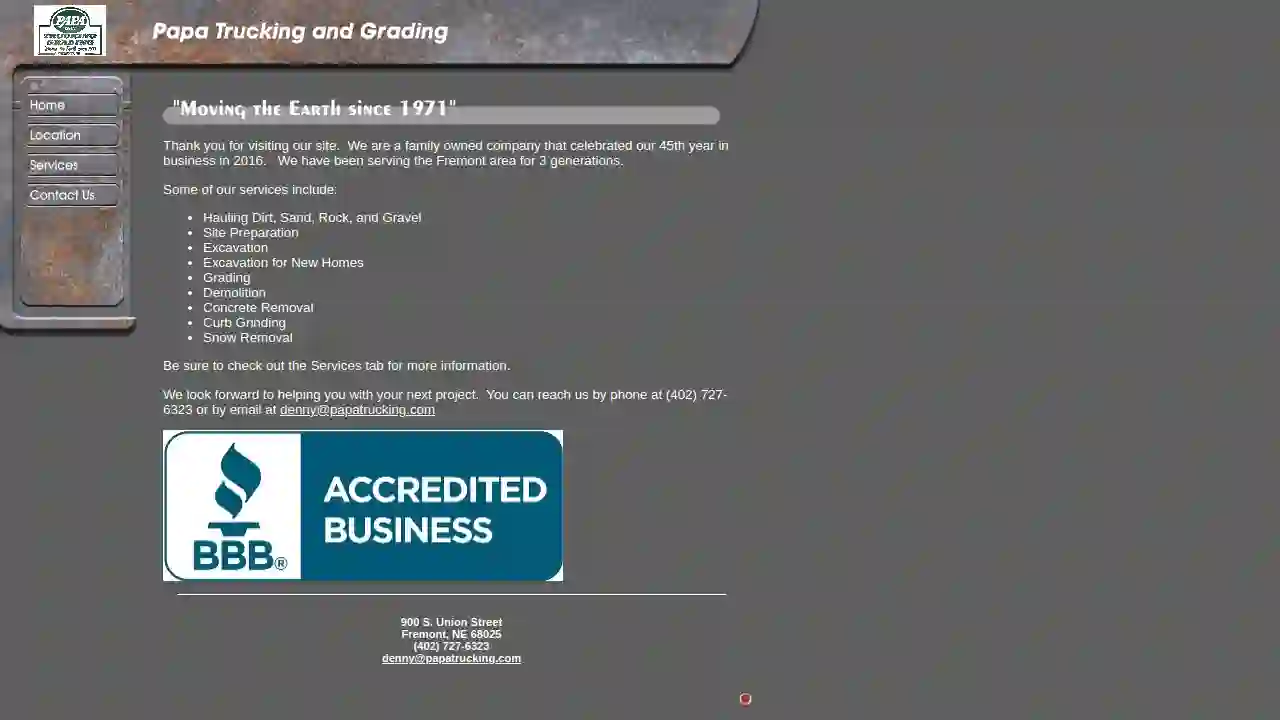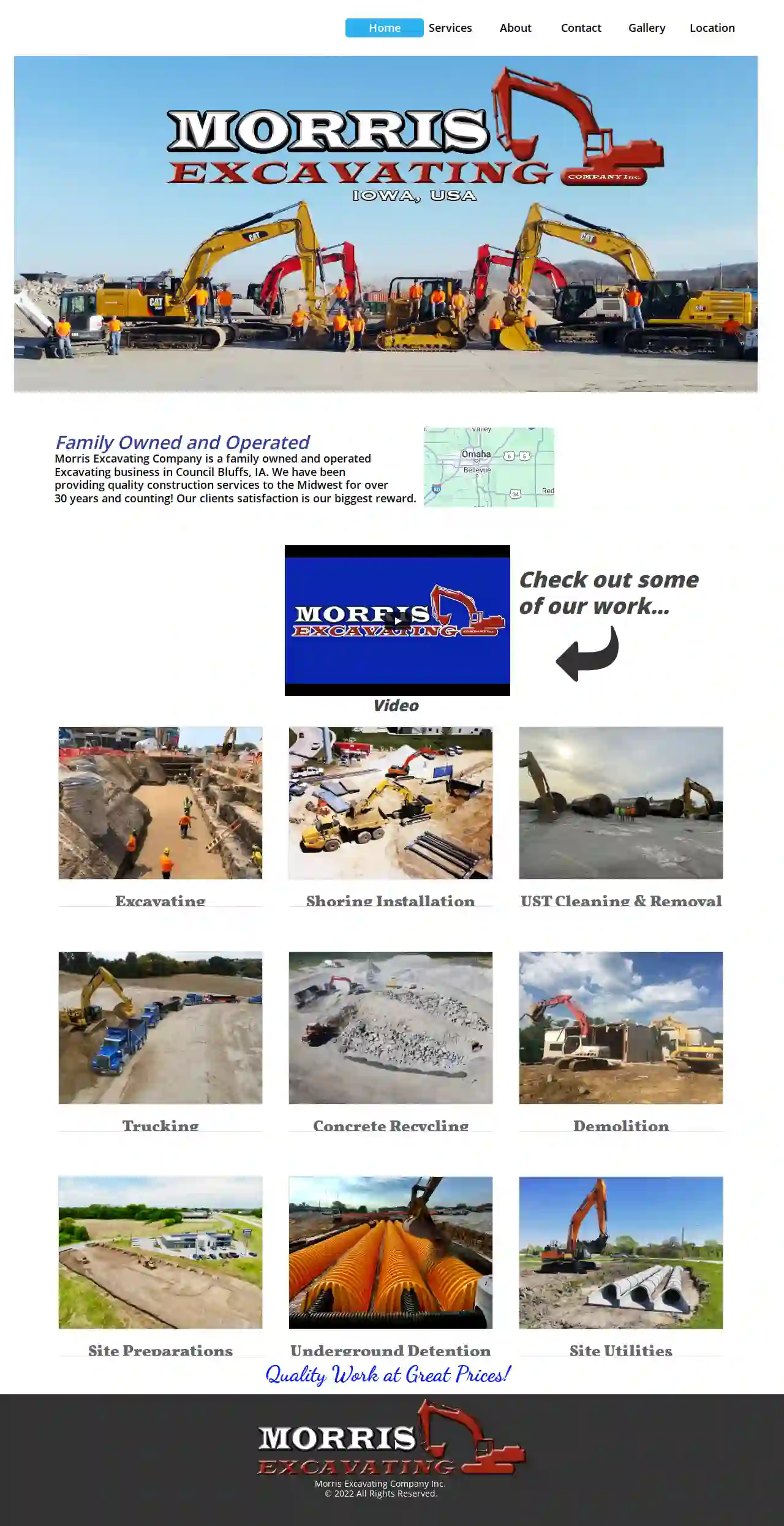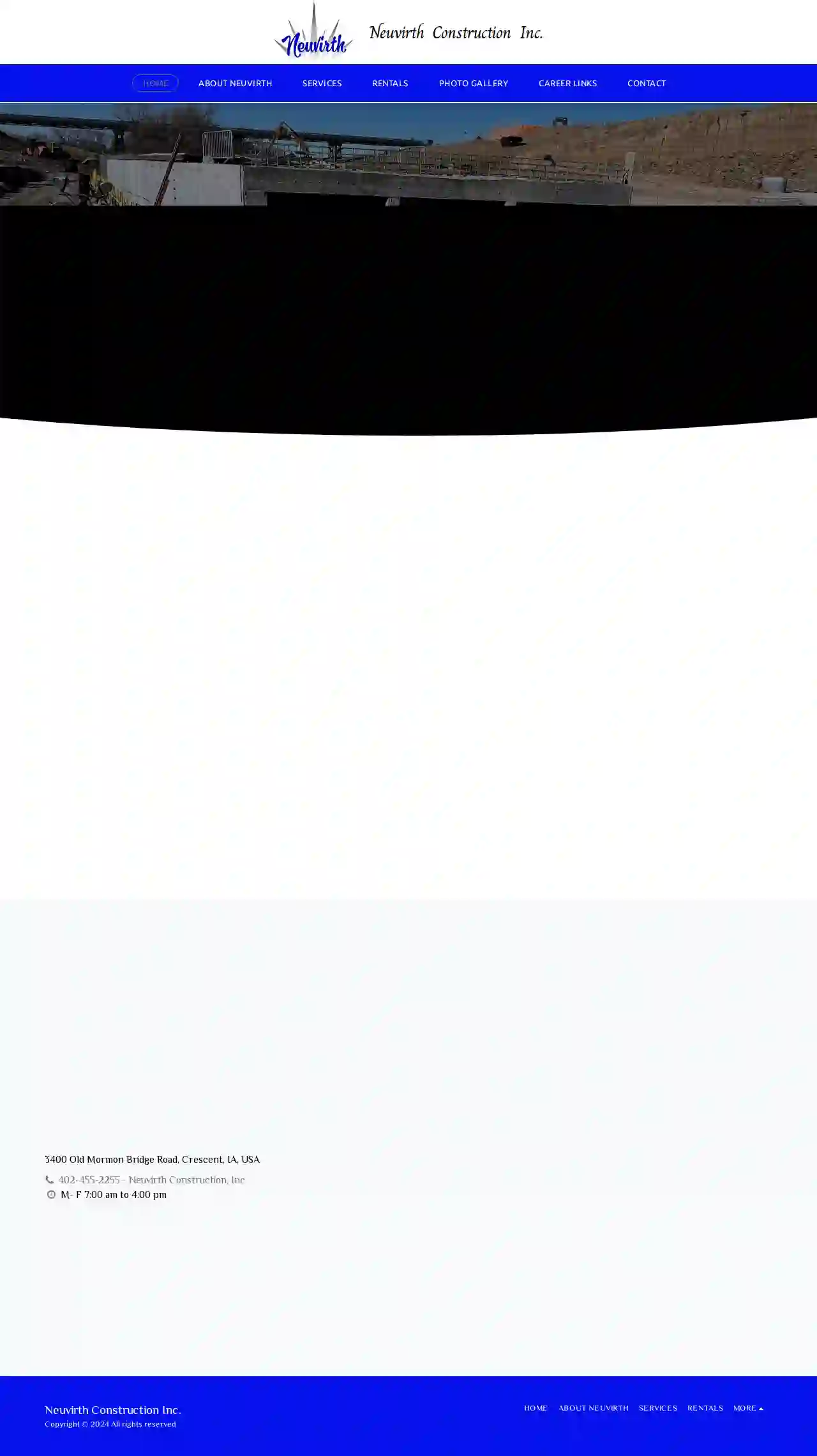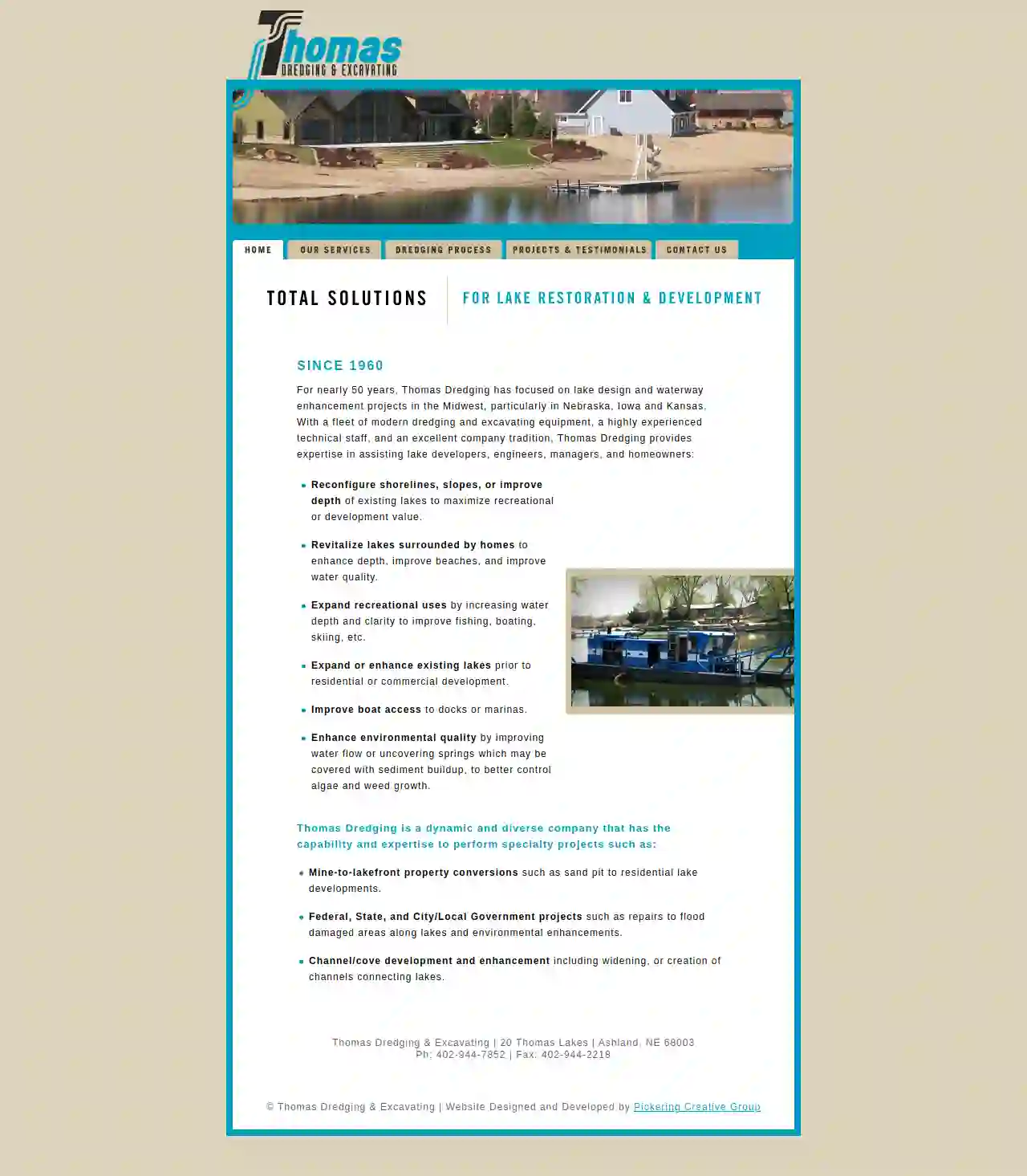Excavation Contractors Omaha
Find top Excavation Contractor in Omaha
Receive multiple Digging Contractors quotes for your project today! Compare profiles, reviews, accreditations, portfolio, etc... and choose the best deal.

Papa Trucking & Grading
4.513 reviewsOmaha, USPapa Trucking is a family-owned business that has been serving the Fremont area for three generations. We celebrated our 45th year in business in 2016. We are committed to providing our customers with high-quality services at competitive prices. We are proud of our reputation for reliability and customer satisfaction.
- Services
- Why Us?
- Gallery
Get Quote
Morris Excavating Co Inc
59 reviews100 Morris Rd, Ballston Spa, 12184, USMorris Excavating Co. - Your Trusted Partner for Excavation Services Morris Excavating Co. is a family-owned and operated business with over 20 years of experience in the excavation industry. We are committed to providing our clients with high-quality, reliable, and affordable excavation services. We have a team of experienced and skilled operators who are dedicated to getting the job done right, on time, and within budget. We understand that excavation projects can be complex and require a high level of expertise. That's why we take a personalized approach to every project, working closely with our clients to ensure that their needs are met. We are also committed to safety and environmental responsibility, and we always strive to minimize our impact on the environment. Whether you need site preparation, foundation excavation, utility installation, or any other excavation services, Morris Excavating Co. is the company to call. We are confident that you will be satisfied with our work.
- Services
- Why Us?
Get Quote
Neuvirth Construction
38 reviews3400 Old Mormon Bridge Road, Crescent, USAbout NEUVIRTH Neuvirth Construction started as an underground utility company and has grown to include other divisions such as: steel buildings, structures, earthwork, and daylighting. With over 30 years of experience in site work, data centers, water and wastewater treatment plants, and water/sewer rehabilitation, we are able to push the boundaries and continue to expand as a company for the future. Drawing from decades of experience, we combine years of skilled management across all operations such as, safety, personnel, procurement, accounting, and logistics to deliver quality services.
- Services
- Why Us?
- Gallery
Get Quote
Thomas Dredging & Excavating
4.52 reviews20 Thomas Lakes, Ashland, 68003, USSince 1960 For nearly 50 years, Thomas Dredging has focused on lake design and waterway enhancement projects in the Midwest, particularly in Nebraska, Iowa and Kansas. With a fleet of modern dredging and excavating equipment, a highly experienced technical staff, and an excellent company tradition, Thomas Dredging provides expertise in assisting lake developers, engineers, managers, and homeowners: Reconfigure shorelines, slopes, or improve depth of existing lakes to maximize recreational or development value. Revitalize lakes surrounded by homes to enhance depth, improve beaches, and improve water quality. Expand recreational uses by increasing water depth and clarity to improve fishing, boating, skiing, etc. Expand or enhance existing lakes prior to residential or commercial development. Improve boat access to docks or marinas. Enhance environmental quality by improving water flow or uncovering springs which may be covered with sediment buildup, to better control algae and weed growth. Thomas Dredging is a dynamic and diverse company that has the capability and expertise to perform specialty projects such as: Mine-to-lakefront property conversions such as sand pit to residential lake developments. Federal, State, and City/Local Government projects such as repairs to flood damaged areas along lakes and environmental enhancements. Channel/cove development and enhancement including widening, or creation of channels connecting lakes
- Services
- Why Us?
- Gallery
Get Quote- Ir
IronCrest Land Services
59 reviewsOmaha, US- Services
- Why Us?
- Gallery
Get Quote
Over 3,943+ Excavation Contractors registered
Our excavation pros operate in Omaha & beyond!
ExcavationHQ has curated and vetted Top Excavation Businesses in Omaha. Find a trustworthy pro today.
Frequently Asked Questions About Excavation Contractors
- Trench Collapses: Unstable trench walls can cave in, posing a severe risk to workers. Proper shoring and sloping are crucial safety measures.
- Utility Damage: Striking underground utilities (gas, water, electric) can cause leaks, explosions, or electrocution. Accurate utility locates and careful digging are essential.
- Falling Objects: Materials or equipment falling into excavations can injure workers. Securing work areas and using appropriate safety gear is vital.
- Equipment Accidents: Operating heavy machinery involves risks of rollovers, collisions, or mechanical failures. Trained operators and proper equipment maintenance are critical.
- Environmental Hazards: Excavated soil might contain hazardous materials (asbestos, lead). Proper testing and disposal procedures are necessary.
- Soil Type and Stability: Stable, cohesive soils allow for deeper excavations than loose or unstable soils.
- Groundwater Level: Excavations below the water table require dewatering techniques to manage water intrusion.
- Equipment and Resources: The size and capabilities of excavation equipment influence the achievable depth.
- Safety Regulations: OSHA and other safety regulations impose limitations on trench depths without proper shoring or sloping.
- Project Requirements: The purpose of the excavation (basement, pool, foundation) determines the necessary depth.
- Excavators: Versatile machines with a bucket, arm, and rotating cab for digging, lifting, and moving earth.
- Backhoes: Similar to excavators but with a digging bucket on the back and a loader bucket on the front, ideal for trenching and smaller excavations.
- Bulldozers: Powerful machines with a large blade for pushing earth, clearing land, and leveling surfaces.
- Skid Steers: Compact and maneuverable loaders with various attachments (buckets, forks) for digging, loading, and grading in tight spaces.
- Trenchers: Specialized machines for digging narrow trenches for utilities.
- Dump Trucks: Vehicles for hauling excavated material to disposal sites.
- Clearly Define the Scope: Outline the project's goals, including the excavation area, depth, grade, and intended use.
- Obtain Necessary Permits: Research and acquire any required permits from your local authorities.
- Mark Utility Lines: Contact your utility companies to locate and mark underground utilities to prevent damage.
- Communicate with Neighbors: Inform your neighbors about the project's timeline and potential noise or disruptions.
- Prepare the Site: Clear any obstacles, such as vegetation, furniture, or structures, from the excavation area.
- Discuss Safety Protocols: Review safety procedures with the contractor to ensure a safe work environment.
What are the risks associated with excavation?
How deep can you excavate?
What equipment is used for excavation?
What should I do before excavation starts?
What are the risks associated with excavation?
- Trench Collapses: Unstable trench walls can cave in, posing a severe risk to workers. Proper shoring and sloping are crucial safety measures.
- Utility Damage: Striking underground utilities (gas, water, electric) can cause leaks, explosions, or electrocution. Accurate utility locates and careful digging are essential.
- Falling Objects: Materials or equipment falling into excavations can injure workers. Securing work areas and using appropriate safety gear is vital.
- Equipment Accidents: Operating heavy machinery involves risks of rollovers, collisions, or mechanical failures. Trained operators and proper equipment maintenance are critical.
- Environmental Hazards: Excavated soil might contain hazardous materials (asbestos, lead). Proper testing and disposal procedures are necessary.
How deep can you excavate?
- Soil Type and Stability: Stable, cohesive soils allow for deeper excavations than loose or unstable soils.
- Groundwater Level: Excavations below the water table require dewatering techniques to manage water intrusion.
- Equipment and Resources: The size and capabilities of excavation equipment influence the achievable depth.
- Safety Regulations: OSHA and other safety regulations impose limitations on trench depths without proper shoring or sloping.
- Project Requirements: The purpose of the excavation (basement, pool, foundation) determines the necessary depth.
What equipment is used for excavation?
- Excavators: Versatile machines with a bucket, arm, and rotating cab for digging, lifting, and moving earth.
- Backhoes: Similar to excavators but with a digging bucket on the back and a loader bucket on the front, ideal for trenching and smaller excavations.
- Bulldozers: Powerful machines with a large blade for pushing earth, clearing land, and leveling surfaces.
- Skid Steers: Compact and maneuverable loaders with various attachments (buckets, forks) for digging, loading, and grading in tight spaces.
- Trenchers: Specialized machines for digging narrow trenches for utilities.
- Dump Trucks: Vehicles for hauling excavated material to disposal sites.
What should I do before excavation starts?
- Clearly Define the Scope: Outline the project's goals, including the excavation area, depth, grade, and intended use.
- Obtain Necessary Permits: Research and acquire any required permits from your local authorities.
- Mark Utility Lines: Contact your utility companies to locate and mark underground utilities to prevent damage.
- Communicate with Neighbors: Inform your neighbors about the project's timeline and potential noise or disruptions.
- Prepare the Site: Clear any obstacles, such as vegetation, furniture, or structures, from the excavation area.
- Discuss Safety Protocols: Review safety procedures with the contractor to ensure a safe work environment.